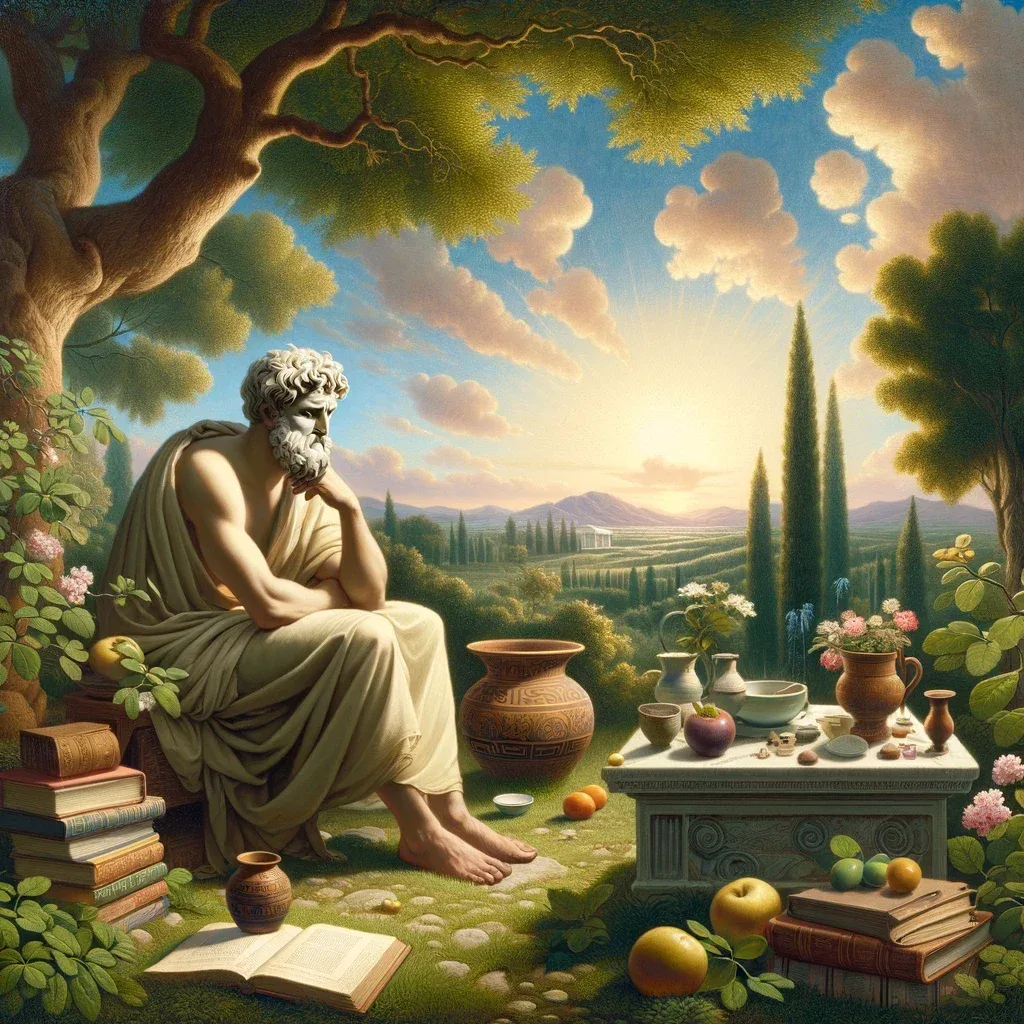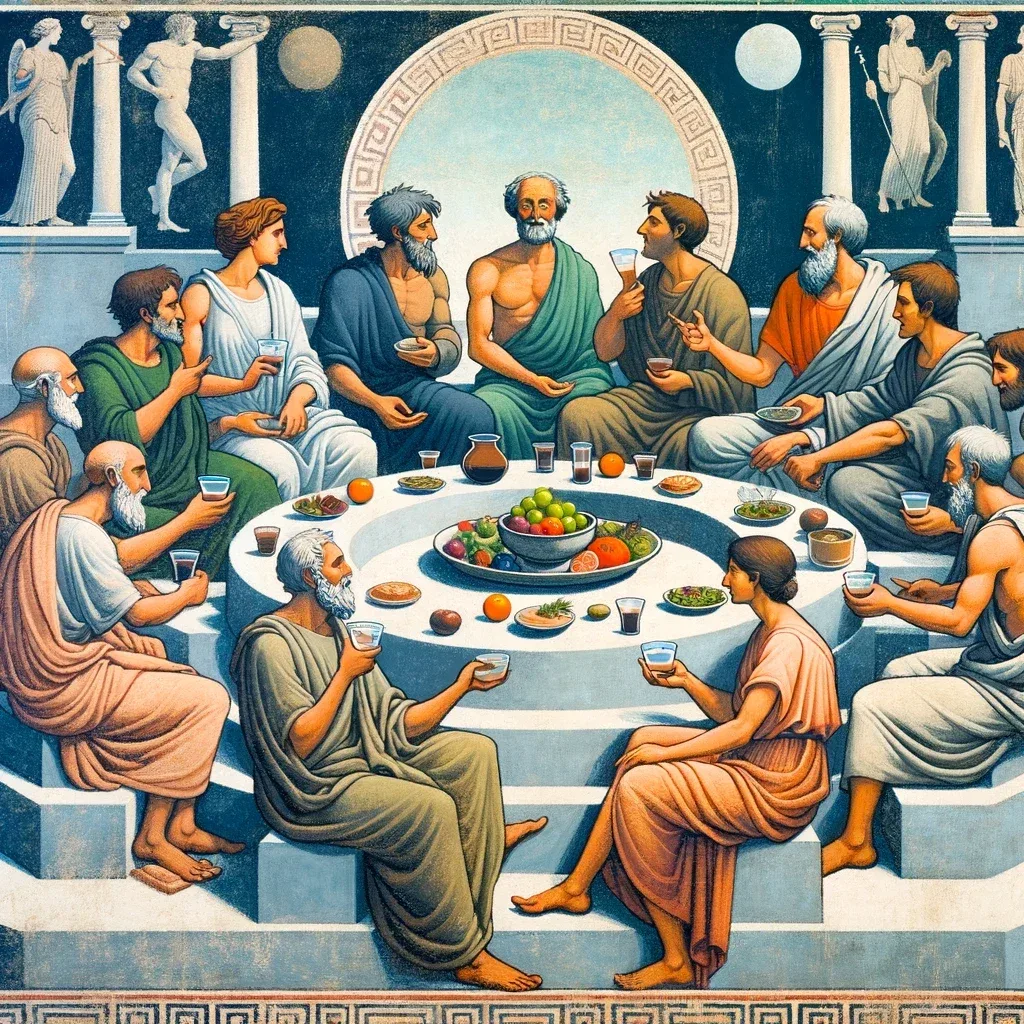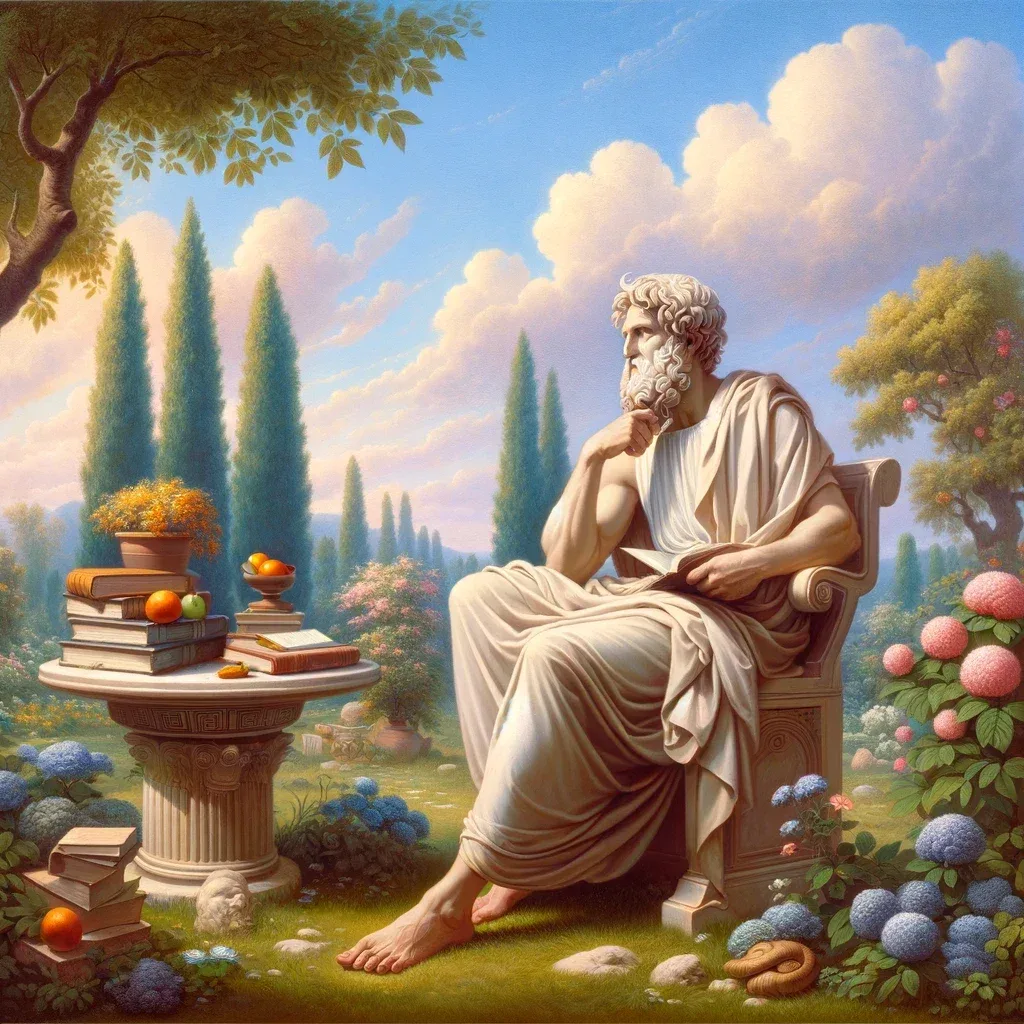The search for happiness is as old as humanity itself. Epicurus, a Greek philosopher who lived between 341-270 BC, proposed a philosophy where happiness is the supreme end of human life. His understanding of happiness, however, differs radically from contemporary concepts full of the incessant search for ephemeral pleasures. This article seeks to unveil Epicurus' definition of happiness and explore how his teachings can be applied in our daily lives to achieve a full and meaningful life.

The Epicurean Foundation of Happiness
The Nature of Pleasure
For Epicurus, happiness is not found in unbridled indulgence, but in the intelligent pursuit of pleasures that lead to the absence of pain and disturbance – a state called 'ataraxia'. Epicurus distinguishes two types of pleasures: pleasures of the body and pleasures of the mind. For him, the greatest pleasures are those of the mind – the intellectual and emotional pleasures that come with understanding oneself and the world around.
The Role of Self-Reliance
Epicurus also considered self-sufficiency (autarkeia) to be essential to happiness. He argued that we should be satisfied with the minimum necessary for life, as natural and necessary needs are easy to obtain and satisfy. Thus, happiness would derive from a simple life, in which the health of the body and tranquility of the mind are sought.
The Importance of Friendship
Another pillar of Epicurean happiness is friendship. Epicurus saw friendship as a safe haven, a place of mutual support and understanding. He believed that the presence of true friends was essential to achieving and maintaining ataraxia.
Demystifying Epicurean Happiness

Confronting Misunderstandings
Contrary to popular perception, Epicurus did not promote unbridled hedonism. Instead, he advocated a rational hedonism, where pleasure is pursued in an intelligent and moderate way. Epicurus was a master at distinguishing between pleasures that lead to a happy life and those that result in pain and suffering.
The Practice of Contentment
Epicurus taught that we should practice being content with what we have, instead of always seeking more. This practice not only leads us to a life of greater simplicity and satisfaction, but it also protects us against the fear and anxiety that come with the potential loss of material possessions.
The Reduction of Cravings
Reducing our desires to just what is necessary is a crucial skill in Epicurean philosophy. By limiting our desires, we are able to maintain a state of tranquility and avoid the suffering that comes from wanting what we don't have or can't have.
The Practical Application of Epicurus' Philosophy

Finding Joy in Everyday Life
Epicurus saw philosophy as medicine for the soul. He suggested that we should reflect daily on the nature of our desires and whether they contribute to our happiness. By doing this, we can find joy in simple, everyday things.
Building Meaningful Relationships
Epicurean philosophy emphasizes the importance of building and maintaining deep, meaningful friendships. In the contemporary world, where connections are often superficial, Epicurus' teachings remind us of the need for genuine relationships.
The Art of Living Well
Living according to Epicurean principles requires an art of living that values reflection, gratitude, and moderation. Practicing these virtues can guide us to a happier and more
done.
Epicurus and Modern Happiness
Contemporary Relevance
Epicurus' teachings are incredibly relevant to modern society. In an age of consumerism and instant gratification, Epicurus' philosophy offers us a sustainable and deeper alternative to finding happiness.
Against Materialism
Epicurus' message is an antidote to materialism. In his ideal world, happiness is disconnected from the accumulation of goods and wealth, focusing more on the quality of human experiences and relationships.
The Balance of Life
Epicurus' philosophy teaches us to seek balance in our lives. He encourages us to find a middle ground between indulgence and abstinence, between work and leisure, between the individual and the collective.
In Search of Ataraxia: Practices for Everyday Life
Meditation and Reflection
Meditation on life and death, impermanence, and the nature of the universe were central practices for Epicurus. Meditating on these topics can help us live a more deliberate and mindful life.
The Value of Contemplation
Contemplation of nature and the world around us also plays an important role in the search for happiness. Appreciating the natural world can be a deep source of joy and satisfaction.
The Practice of Gratitude
Gratitude is another practice recommended by Epicurus. Recognizing and being grateful for what we have, rather than lamenting what we lack, is a fundamental step towards happiness.
Conclusion: The Wisdom of Epicurus in the Modern World
Epicurus teaches us that true happiness does not lie in material riches, but in wisdom, virtue, friendship and serenity of the soul. His ideas continue to be a beacon for those seeking a life full of meaning and contentment. Through understanding and applying Epicurean principles, we can find lasting happiness that is within everyone's reach, regardless of external circumstances.
By adopting a simple life, valuing our relationships, and practicing gratitude, we can live in accordance with nature and experience true joy. Epicurus's wisdom is timeless and may be the key to unlocking a truly happy life in our time.
Frequently Asked Questions About Epicurus' Philosophy of Happiness
The search for happiness is a universal and timeless journey. Epicurus, an Ancient Greek philosopher, offered a unique perspective on this topic. His teachings remain relevant and provocative, even millennia after his conception. Below, we present a detailed FAQ that aims to clarify common doubts about the Epicurean approach to happiness, offering in-depth answers and reflections relevant to the application of this philosophy in modern life.

What is 'ataraxia' for Epicurus?
Ataraxia, in Epicurean thought, is a state of serenity and inner peace achieved through the absence of physical pain (aponia) and mental disturbance. It is the experience of supreme happiness in which the mind is free from irrational fears and desires, allowing the individual to live a virtuous and peaceful life.
How does Epicurus define the pleasures of the mind?
Pleasures of the mind refer to the joys derived from intellectual and emotional activities, such as learning, reflection, love, and friendship. Epicurus valued these pleasures above physical pleasures because they contribute to a lasting feeling of well-being and are less likely to result in negative consequences.
Why is self-reliance important in Epicurus' philosophy?
Self-sufficiency, for Epicurus, means independence from external and unnecessary desires that can cause pain and disturbance. By being content with the essentials in life and finding pleasure in simple things, we can maintain peace of mind and live happier, more authentic lives.
Was Epicurus against the possession of wealth?
Not necessarily. Epicurus did not condemn the possession of wealth, but he warned against excessive desire and dependence on it. He argued that true happiness comes from living a virtuous life and not from accumulating material possessions.
How do friendships contribute to happiness, according to Epicurus?
For Epicurus, friendship is one of the greatest contributors to happiness. Friends offer emotional, intellectual and even material support in times of need. Friendship provides security, pleasure and is fundamental to maintaining ataraxia.
Does Epicureanism promote an ascetic lifestyle?
Not exactly. Epicureanism promotes a lifestyle that values moderation and discernment between natural and necessary desires and those that are vain and insatiable. Epicurus encouraged pleasure, but with the understanding that true happiness is achieved through moderation and wisdom.
How can I apply Epicurus' teachings to the modern world?
We can apply Epicurus' teachings by focusing on what is essential for happiness – health, friendships, reflection and personal development. This may mean living more simply, valuing experiences over possessions, and cultivating meaningful relationships.
Did Epicurus believe in gods or the afterlife?
Epicurus believed in gods, but not in the traditional way. He thought that the gods were happy, immortal beings who did not get involved in human affairs. As for life after death, Epicurus did not believe there was anything after death, so we should not fear non-existence.
Is epicurean happiness possible in a consumerist society?
Yes, it is possible. Epicurean philosophy offers a countercultural perspective that challenges the norms of consumerism. Even in a society focused on materialism, happiness can be found through appreciating the simple life, seeking knowledge, and maintaining valuable relationships.
How does Epicureanism differ from modern hedonism?
Modern hedonism often
The mind interprets pleasure as unlimited indulgence in desires and sensations. In contrast, Epicureanism preaches a rational hedonism, where pleasure is pursued with wisdom and self-discipline, avoiding negative consequences and seeking the sustainability of happiness in the long term.
With these questions and answers, we hope to offer valuable insights into how Epicurus's philosophy can be understood and incorporated into contemporary life, guiding us on our own journey to a fulfilling and happy existence.







